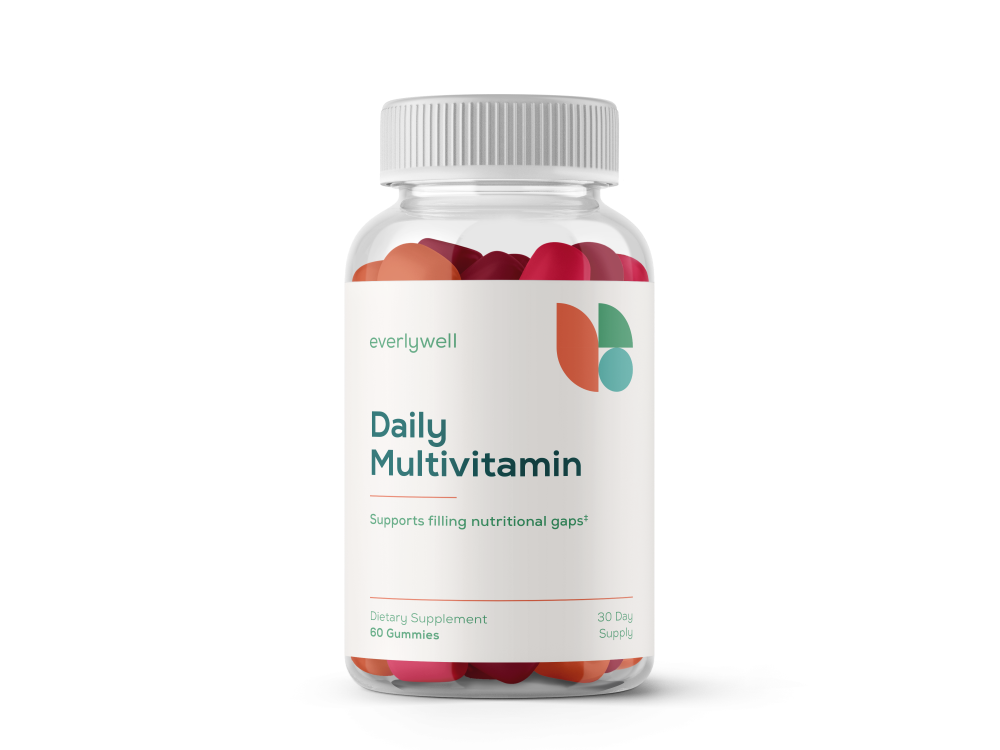Women's Health Test
/each
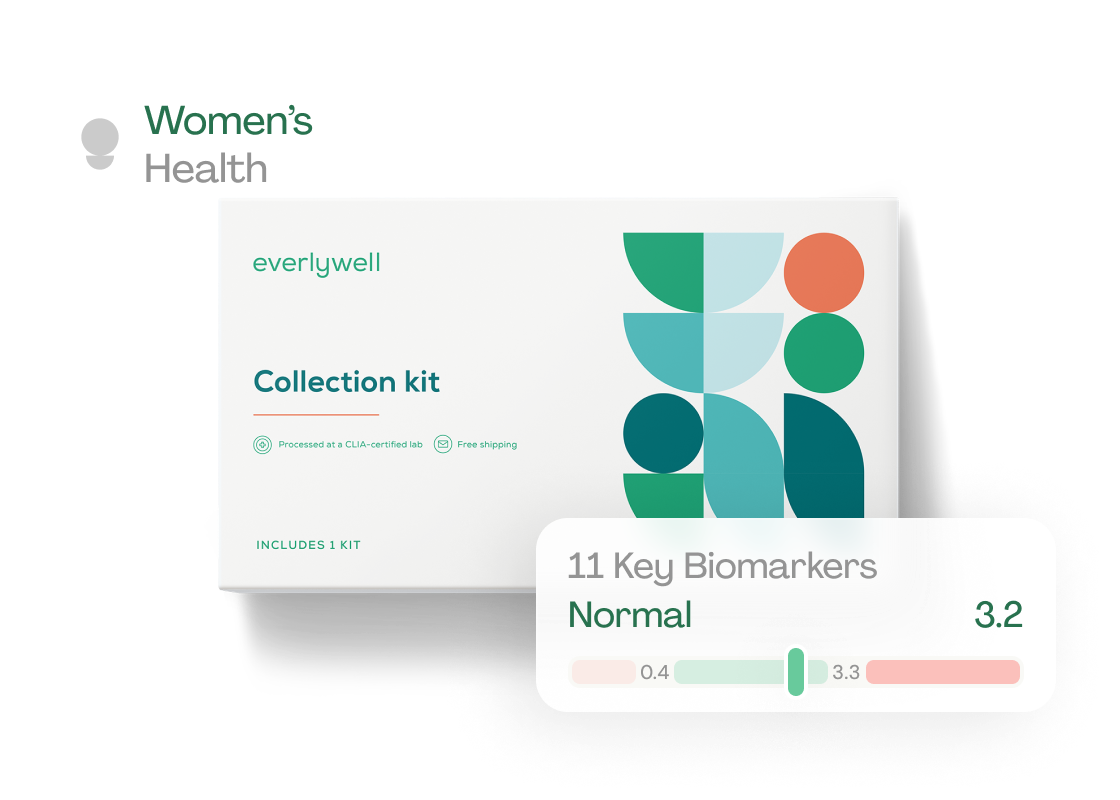

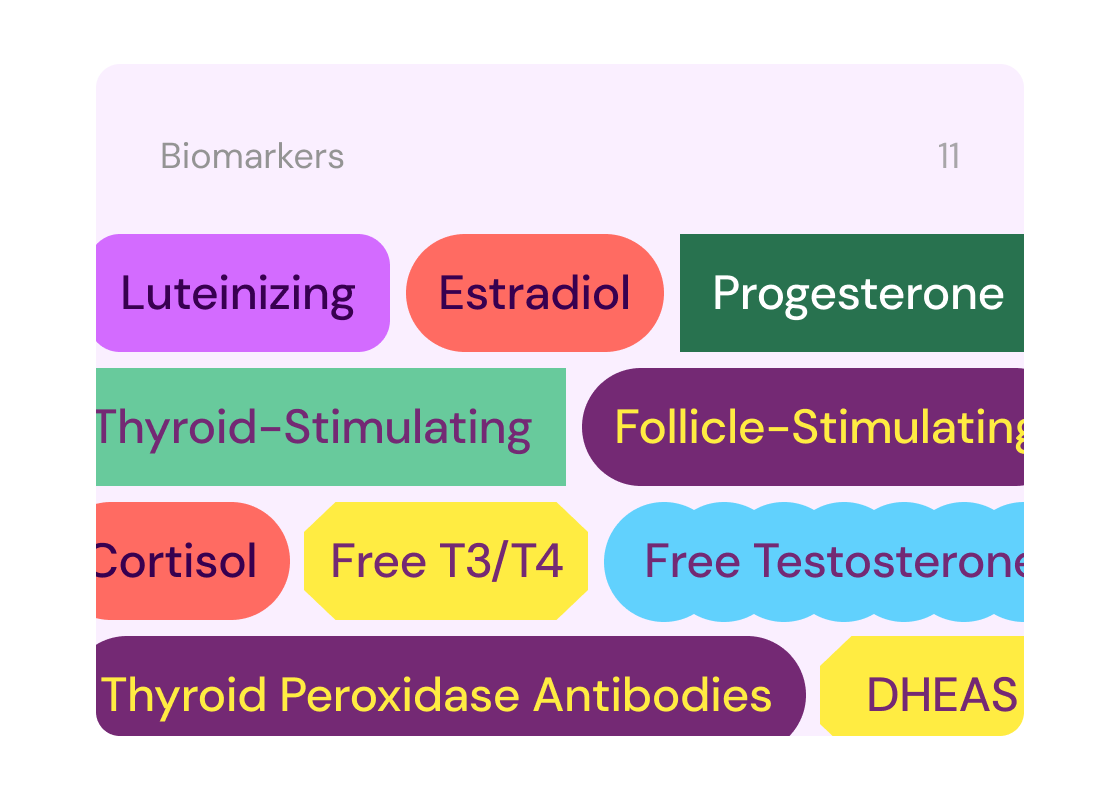

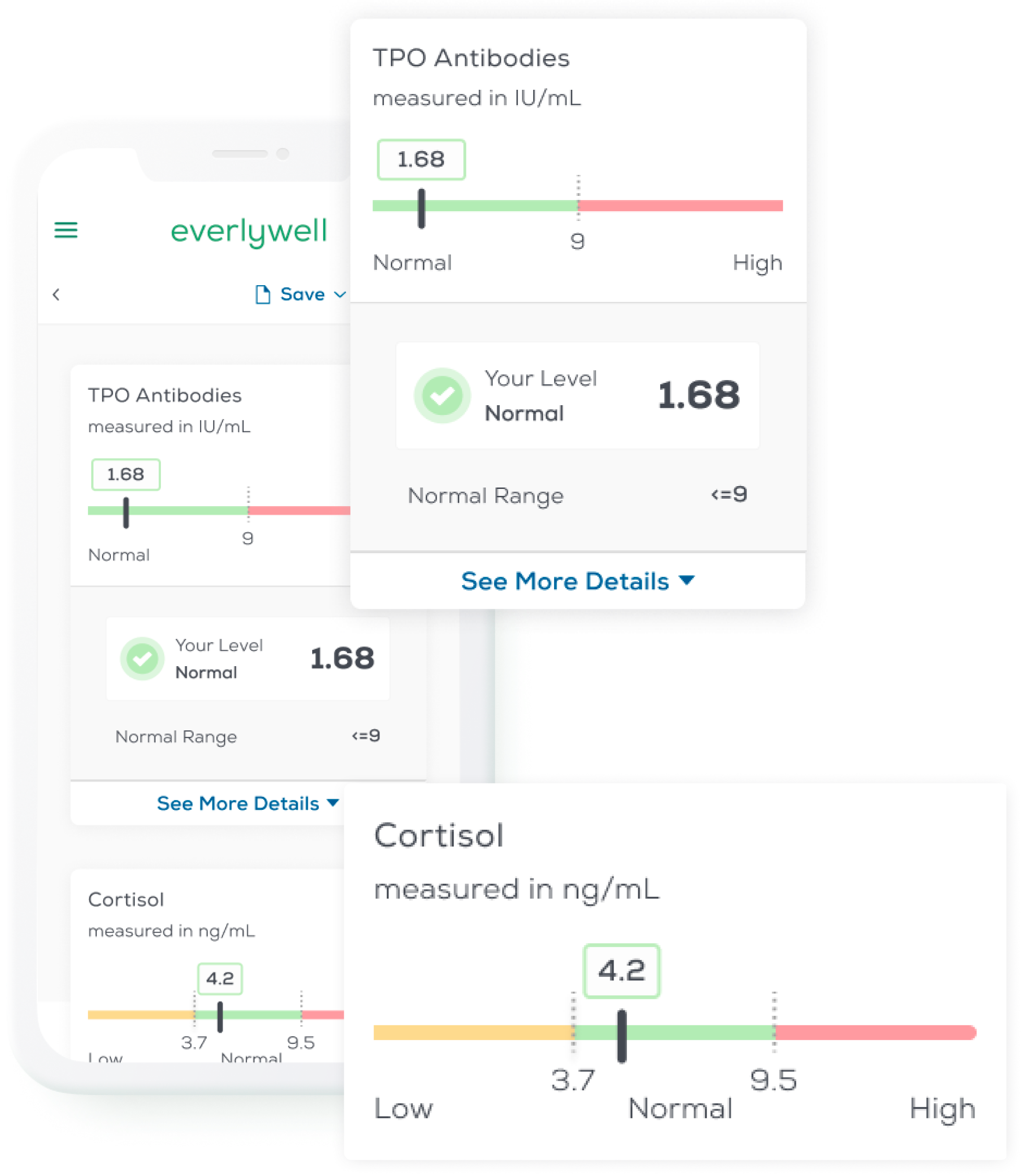

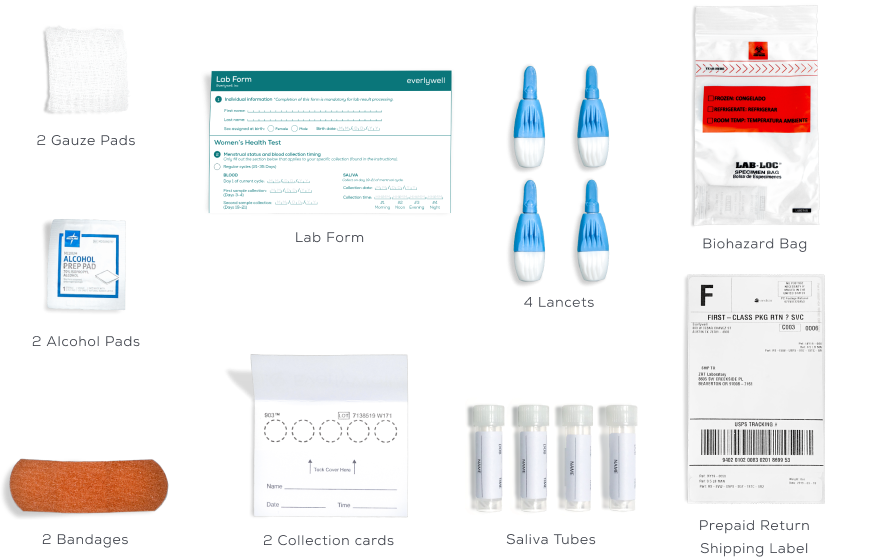



Our at-home lab test measures 11 key biomarkers and explains the hormones and antibodies that can affect your reproductive and general health.
Measures levels of key female hormones
Finger prick sample
Saliva sample collection
We measure 11 biomarkers known to play an important role in your overall health and wellness
Your results will provide detailed information on the 11 biomarkers (10 hormones and 1 antibody) measured and let you know whether those levels fall within established ranges for your reproductive stage. Abnormal levels may be causing symptoms that keep you from feeling your best.
EstradiolEstradiol is the main form of estrogen in people assigned female at birth (AFAB) and is produced by the ovaries. It is one of the main sex hormones responsible for ovulation, which is vital to reproductive health and pregnancy in people who can get pregnant. After menopause, levels of estradiol decline significantly. Estradiol also plays a role in the development of bones and female-associated secondary sex characteristics development, as well as the optimal functioning of the brain and reproductive system.
ProgesteroneProgesterone helps to maintain the endometrium, or lining of the uterus, and helps to support pregnancy. When an individual enters menopause and ovarian function declines, progesterone production significantly decreases.
Luteinizing HormoneLuteinizing hormone, or LH, is a hormone produced in the pituitary gland that is responsible for the stimulation and maturation of ovarian follicles in the ovaries. Ovarian follicles are small, fluid-filled sacs in the ovary that contain an immature egg. When an egg matures during the menstrual cycle, the follicle breaks open and releases the egg from the ovary for possible fertilization.
Follicle-Stimulating HormoneFollicle-stimulating hormone, or FSH, is a hormone produced by the pituitary gland in the brain, which plays an essential role in the growth and maturation of ovarian follicles, as well as with ovulation and the menstrual cycle. Baseline FSH levels typically increase with age due to diminished ovarian reserve, and over time more FSH is then needed to stimulate ovarian function. A normal FSH level may imply that a person with a uterus has an appropriate egg quantity for their reproductive stage.
DHEAS (dehydroepiandrosterone sulfate)DHEA, or dehydroepiandrosterone, is an androgen hormone that is produced by the adrenal glands, but in people assigned female at birth (AFAB), a small amount is also produced by the ovaries. It is a precursor to some other hormones in the body, such as testosterone and estrogen. Most DHEA circulates in the blood attached to a sulfate group and is called DHEA-S, which is the form measured by this test.
CortisolCortisol is produced in the adrenal glands and is released in response to stressors like illness and exercise. Cortisol is often referred to as your body’s “stress hormone,” but it has many roles in the body, including helping to control blood sugar levels and regulating energy metabolism. In most people, cortisol levels peak in the morning and are lowest in the middle of the night. Your sample is collected 4 times throughout the day, and your results will reflect your cortisol levels during those times.
Thyroid-Stimulating HormoneThyroid-stimulating hormone, or TSH, is a hormone produced by the pituitary gland that is responsible for controlling the production of the thyroid hormones T3 and T4 by the thyroid gland. The hormone TSH is considered the most sensitive marker for screening for thyroid diseases and conditions.
Free T3T3 (triiodothyronine) is a hormone produced by the thyroid gland. While it is less abundant than T4, T3 is considered the more active of these two thyroid hormones. Together, these two thyroid hormones help determine the rate at which every cell in the body uses energy. Levels of T3 fluctuate when individuals have an under- or overactive thyroid gland. This test measures free T3, the free (not bound to protein), and biologically active form of the hormone.
Free T4T4 (thyroxine) is the predominant hormone produced by the thyroid gland. Together, T3 and T4 help determine the rate at which every cell in the body uses energy. Levels of T4 fluctuate when individuals have an under- or overactive thyroid gland. This test measures free T4, the free (not bound to protein), and biologically active form of the hormone.
Free TestosteroneIn people assigned female at birth (AFAB), testosterone is primarily produced by the ovaries, with a small amount produced by the adrenal glands. A large portion of this testosterone is converted to estrogen by an enzyme called aromatase. Free testosterone is not attached to proteins, whereas total testosterone includes free testosterone and testosterone that is bound to the proteins (e.g. albumin and sex hormone binding globulin) in the blood. While commonly regarded as the primary male sex hormone, testosterone is important for bone density, libido, body fat distribution, and supporting muscle mass across all sexes.
Thyroid Peroxidase AntibodiesThyroid peroxidase antibodies are antibodies that can bind to thyroid enzymes, which can suppress thyroid function. They are usually elevated in a condition called Hashimoto's disease, which is the most common cause of hypothyroidism in the U.S.
Checking in on your hormones can equip you with valuable insights into your overall health. Knowing whether your levels fall within a normal range is the first step to understanding any changes you might experience.
This test can be taken and used by people of all genders, though many hormones have much higher levels in people assigned female at birth (AFAB).Below are common symptoms that may indicate your hormone levels are outside the normal range:
Body
- Fatigue or feeling tired
- Joint pain
- Muscle weakness
- Increased body fat
- Night sweats
- Weight gain
- Cold or heat intolerance
- Abnormal hair growth
- Headaches
- Hair loss
- Skin issues (acne, dryness)
Mind
- Depression
- Difficulty concentrating
- Sleep disturbances
- Irritability or anxiousness
- Forgetfulness
Reproductive
- Irregular periods
At-home lab testing made easy
- Pre-paid shipping (both ways)
- Everything you need to collect your sample and send it in
- Detailed directions and an instructional video
- Our care team is standing by if you have questions
- Digital (and printable) results
- Educational video sessions, led by healthcare professionals

Everlywell Women's Health Test
Measure key women's health hormones
Better health starts here
How it all works
1
Register your test
Once your test arrives, head to everlywell.com or open your Everlywell app to register. Just Scan the QR code on the box to seamlessly plug in your test ID.


2
Test from the comfort of home
When you're ready, collect your sample and mail it in (following the directions in your kit) using the prepaid shipping label.


3
Get answers in days
Your physician-reviewed results will be ready in your account in a few days.
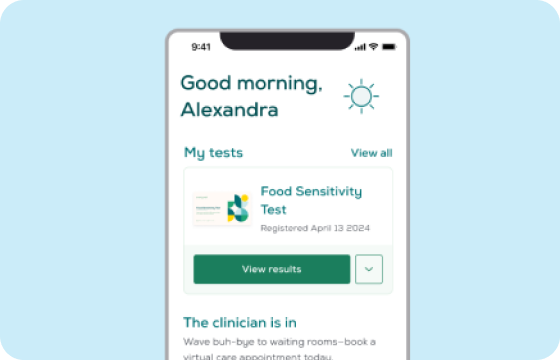

4
Healthy doesn’t happen alone
We'll offer lifestyle insights and guidance tailored to your results that you can use to make healthier choices.


1
Register your test
Once your test arrives, head to everlywell.com or open your Everlywell app to register. Just Scan the QR code on the box to seamlessly plug in your test ID.


2
Test from the comfort of home
When you're ready, collect your sample and mail it in (following the directions in your kit) using the prepaid shipping label.


3
Get answers in days
Your physician-reviewed results will be ready in your account in a few days.


4
Healthy doesn’t happen alone
We'll offer lifestyle insights and guidance tailored to your results that you can use to make healthier choices.



100% digital
Your results
Easy to access, even easier to understand
Gain meaningful insights about your health with easy-to-understand test results without the complex jargon.
You'll receive a complete breakdown of your report—including each marker tested and what your results mean for you.
Use your report to make an action plan with concrete next steps. And don't worry, we'll provide some additional resources and helpful tips along the way.
Care you can count on
Backed by science, reviewed by doctors

CLIA-certified laboratories
Each lab we work with is CLIA-certified (Clinical Laboratory Improvement Amendments). This means they must meet high standards to obtain both state and federal certifications and submit themselves to regular inspections.

Physician-reviewed results
All tests are reviewed by an independent board-certified physician within your state.

Your privacy matters
Everlywell is HIPAA-compliant. This means we never sell your health data and we always store it securely—in fact, we use state-of-the-art, bank-grade encryption.
Related tests
Customers also bought
FAQs
You have questions, we have answers
The list below shows medications and supplements that may affect test results, but it is not intended to be a comprehensive list of all medications, including hormonal therapies, that may affect your results. Please consult with your healthcare provider if you have questions about how your medication may affect test results.
Prescription: Mirena IUD, Skyla IUD, Kyleena IUD, Nexplanon, Combined Oral Contraceptive Pills, Progestin Only Oral Contraceptive Pills (MiniPill), Combined Hormone Replacement, Progestin Only Hormone Replacement, Estrogen Only Hormone Replacement (including vaginal), Spironolactone
Over-the-counter: Soy Supplements, Chasteberries, Red Clover, DHEAS, Thyroid Supplements
Note: If discontinuing hormone therapy, we advise waiting 6 weeks prior to collecting your sample.
Our hormones are constantly changing and differences in levels can change how you feel day to day. Hormone levels outside of normal ranges can affect your menstrual cycle, mood, metabolism, libido, and sleep. Testing hormones is a critical step in understanding a woman’s reproductive and general health. Knowing if you have a hormonal imbalance is the first step to understanding the changes you may be experiencing in your body.
The Everlywell Women's Health at-home lab test is our most comprehensive panel for a complete look at all the hormones that are critical to a woman's well-being. This test checks many of your sex hormone levels so you can discover if your levels are too high or low compared to reference ranges.
Our Women’s Health test is taken in your own home, and results are provided by an experienced, CLIA-certified laboratory. At a low price for all of these tests, this is the perfect starting point for those wanting to take a first step in assessing their own hormone levels before turning to more expensive, difficult, or complex alternatives.
This easy-to-use female comprehensive hormone panel will provide you with your levels of each of the 11 biomarkers (10 hormones and 1 antibody) measured in our Women’s Health test and whether your levels fall within established normal ranges for your life stage.
As with all of our tests, we encourage you to share your results with your healthcare provider as he/she can best offer guidance in your health and hormonal questions.
Here’s how to test hormone levels from the comfort of home:
The Everlywell Women’s Health test lets you easily check for 11 key markers all from the comfort of your own home. The kit includes everything you need– even a prepaid shipping label to send your samples to the lab.
This easy-to-use female hormone test can detect abnormal hormone and antibody levels, and it also includes detailed instructions for how to collect your blood and saliva samples.
To collect your blood sample, just prick your finger and apply a few drops of blood to the collection card. The saliva sample is collected by spitting into the saliva tubes provided in the kit.
You’ll then send your samples to the lab, and just days later, your test results will be ready to view on our secure, online portal.
Our at-home Women’s Health Test uses two sample types to check hormone levels: blood and saliva. Collecting both sample types is simple:
Blood test sample collection only requires a simple finger prick (Learn more)
For collecting your saliva sample, you just spit into the tube that comes with the kit (Learn more)
Saliva testing can give you accurate information about your hormone levels. A large amount of research done in the past decades has shown that hormone levels in saliva correlate with hormone levels in blood (for many hormones). So saliva tests offer a convenient, noninvasive way to evaluate a wide range of hormones, and saliva testing techniques can be just as accurate as blood testing methods.
Example: Salivary Cortisol
Studies show that salivary cortisol reflects the body’s cortisol levels just as well as measurements of cortisol in blood.
Additionally, research shows that salivary cortisol is useful as a screening test for conditions like Cushing’s syndrome (a condition that results in excess cortisol in the body, sometimes due to a pituitary tumor).
Also, all sample collection and testing methods used for Everlywell kits are well-established and widely-used in scientific and medical circles. For this reason, our tests can give you reliable, accurate insight into your body’s hormone levels.
If a hormone panel test reveals that your hormones are outside normal levels (which can sometimes be referred to as a hormone imbalance), consider talking with your healthcare provider. A healthcare professional can take into consideration your medical history, a physical exam, and other factors to help you get the most value from your at-home lab test results.
Can hormone imbalances be treated?
In many cases, hormonal imbalances are treatable. For example, your healthcare provider may recommend hormone replacement therapy for certain thyroid hormone disorders, menopausal symptoms, and more.
Hormone therapy isn’t the only possible way to treat hormonal imbalances, however. For example, your healthcare provider may prescribe medication that blocks the effects of testosterone if your T levels are too high.
However, hormone therapy is not the only treatment option. Your healthcare provider may suggest lifestyle changes, medications, or other interventions depending on the specific hormone imbalance. Since hormonal imbalances can be caused by various factors, it is important to work with a healthcare provider to determine the best treatment plan for your specific situation.
Fast telehealth visits
Our expert team of clinicians will help you start your journey to better health
Schedule visit

